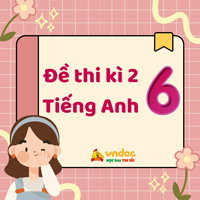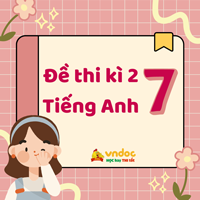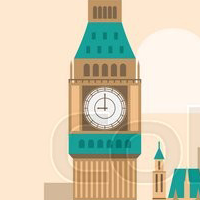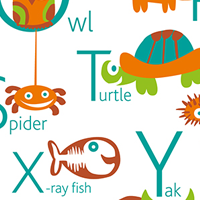Ngữ pháp Tiếng Anh lớp 11 Unit 9 Cities Of The Future
English 11 Grammar Unit 9 Cities Of The Future
Tài liệu lý thuyết Ngữ pháp Tiếng Anh lớp 11 Unit 9 dưới đây nằm trong bộ đề ôn tập Tiếng Anh lớp 11 chương trình mới theo từng Unit do VnDoc.com sưu tầm và đăng tải. Tài liệu Tiếng Anh gồm 2 phần ngữ pháp trọng tâm Unit 9:
Câu điều kiện loại 0 - Conditional Type 0
giúp học sinh lớp 11 nhắc lại phần ngữ pháp Tiếng Anh quan trọng này.
I. QUESTION TAGS:
CÁCH THÀNH LẬP
- Câu hỏi đuôi gồm có: chủ ngữ (phải là đại từ nhân xưng) và trợ động từ hay động từ đặc biệt.
- Nếu câu phát biểu ở thể khẳng định thì câu hỏi đuôi ở thể phủ định và ngược lại.
- Nếu câu hỏi đuôi ở thể phủ định thì phải dùng hình thức tĩnh lược (contractive form).
- Phần câu hỏi đuôi phủ định thường được viết rút gọn. Chủ ngữ của câu hỏi đuôi luôn luôn là một đại từ
Ex:
STATEMENTS | QUESTION-TAGS |
He is a good boy, The girl didn't come here yesterday, They will go away, She hasn't left, | isn’t he? did she? won't they? has she? |
ĐẶT BIỆT:
1. Phần đuôi của “ I am” là “aren’t I”
Eg: I’m going to do it again, aren’t I?
2. Imperatives and Requests ( Câu mệnh lệnh và câu yêu cầu):
+ Có phần đuôi là “won’t you?” khi câu phát biểu diễn tả lời mời:
Eg: Take your seat, won’t you? (Mời ông ngồi)
+ Có phần đuôi là “will you?” khi câu phát biểu diễn tả lời yêu cầu hoặc mệnh lệnh phủ định.
Eg: Open the door, will you? ( Xin vui lòng mở cửa)
Don’t be late, will you? (Đừng đi trễ nha.)
3. Phần đuôi của câu bắt đầu bằng “ Let’s ...”: là “shall we?”
Eg: Let’s go swimming, shall we?
* Nothing, anything, something, everything được thay là thế bằng “ It” ở câu hỏi đuôi:
Eg : Everything will be all right, won’t it?
* No one, Nobody, anyone, anybody, someone, somebody, everybody, everyone được thay thế bằng “They” trong câu hỏi đuôi.
Eg: Someone remembered to leave the messages, didn’t they?
Lưu ý: Nothing, Nobody, No one được dùng trong mệnh đề chính, động từ ở câu hỏi đuôi sẽ phải ở dạng thức khẳng định. (Vì Nothing, Nobody, No one có nghĩa phủ định)
Eg: Nothing gives you more pleasure than listening to music, does it ?
4. This/ That được thay thế là“It”. Eg: This won’t take long, will it?
5.These/ Those được thay thế là“They”.
Eg: Those are nice, aren’t they?
6. Khi trong câu nói có từ phủ định như:seldom, rarely, hardly, no, without, never, few, little… phần đuôi phải ở dạng khẳng định.
Eg: He seldom goes to the movies, does he?
7. Nếu câu phát biểu có dạng :
You’d better → câu hỏi đuôi sẽ là : hadn’t you ?
You’d rather → câu hỏi đuôi sẽ là : wouldn’t you ?
You used to → câu hỏi đuôi sẽ là : didn’t you ?
S + ought to + V → câu hỏi đuôi sẽ là oughtn't + S?
8. Câu đầu là "wish" thì ta dùng “May” trong câu hỏi đuôi.
Eg: I wish to be rich, may I?
9. Câu đầu có I + các động từ sau: think, believe, suppose, figure, assume, fancy, imagine, reckon, expect, seem, feel + mệnh để phụ: Ta lấy mệnh phụ làm câu hỏi đuôi.
Eg: I think he will come here, won't he?
Note:
- Mệnh đề chính có not thì vẫn tính như ở mệnh để phụ.
- Cùng mẫu này nhưng nếu chủ từ không phải là I thì lại dùng mệnh đề đầu làm câu hỏi đuôi.
10. Câu đầu có “It seems that + mệnh đề” ta lấy mệnh đề làm câu hỏi đuôi.
Eg: It seems that you are right, aren't you?
11. Câu cảm thán: Lấy danh từ trong câu đổi thành đại từ, [to be] dùng “is, am, are”
Eg: How intelligent you are, aren't you?
12. Chủ ngữ là ONE ta dùng “you” hoặc “one”.
Eg: One can be one's master, can't you/one?
13. Chủ từ là mệnh đề danh từ: Dùng “it”
Eg: - What you have said is wrong, isn't it?
II. CONDITIONAL SENTENCE TYPE 0
- Usage: Conditional sentences type 0 are used to talk about a scientific fact or something that is generally true. They often express habitual or automatic results. If can be replaced by when
(Dịch: Câu điều kiện loại 0 được sử dụng để nói về một dự kiện khoa học hoặc một sự thực. Câu điều kiện loại 0 thường dùng để nhấn mạnh một thói quen hoặc kết quả tất yếu sẽ xảy ra. Trong trường hợp này If có thể thay thế bằng When.)
- Forms:
If – clause | Main clause/ result clause |
Present tense | - Present simple tense - Imperative form |
- Ex: - If you are late, we leave before you come. (Diễn tả một thói quen)
- If you know the answer, tell the class. (Câu mệnh lệnh)
III. Bài tập vận dụng Tiếng Anh 11 Unit 9
Complete the zero conditional sentences with the verb in brackets. Use contractions where possible.
1. It's easier to sleep if ______________ (you / not / be) stressed.
2. The teacher gets angry if ______________(we / not work) hard.
3. If you press that button, the light ______________(come) on.
4. They play football if ______________(they / not / have) any homework.
5. If you freeze water, ______________(it / turn) to ice.
1. It's easier to sleep if ________you aren’t______ (you / not / be) stressed.
2. The teacher gets angry if ______we don’t work________(we / not work) hard.
3. If you press that button, the light ______comes________(come) on.
4. They play football if _______don’t have_______(they / not / have) any homework.
5. If you freeze water, _____it turns_________(it / turn) to ice.
Complete the sentences with the correct question tags
1. Peter played handball yesterday, ______________?
2. They are going home from school, ______________?
3. They don't have a very nice house,______________?
4. She is the richest woman in the town, ______________?
5. You'll see John tomorrow, ______________?
1. Peter played handball yesterday, _______didn’t he_______?
2. They are going home from school, _______aren’t they_______?
3. They don't have a very nice house,_______do they_______?
4. She is the richest woman in the town, ______isn’t she________?
5. You'll see John tomorrow, ____won’t you__________?
Put the verbs into the correct form (the zero conditional, the first conditional or the second conditional).
1. If you (not be) careful, you'll burn yourself.
________________________________________________________
2. Would you go to see the headmaster if they (start) bullying you again?
________________________________________________________ .
3. I (not lend) him any money even if I had some.
________________________________________________________
4. If he (have) a choice, he always chooses ice cream for pudding.
________________________________________________________
5. I would be so happy if he (ask) me out.
________________________________________________________.
6. If you heat ice, it (turn) to water.
________________________________________________________
1. If you aren’t careful, you'll burn yourself.
2. Would you go to see the headmaster if they started bullying you again? .
3. I wouldn’t lend him any money even if I had some.
4. If he has a choice, he always chooses ice cream for pudding.
5. I would be so happy if he asked me out.
6. If you heat ice, it turns to water.
Trên đây là toàn bộ nội dung của Ngữ pháp Tiếng Anh lớp 11 Unit 9 Cities Of The Future. Mời thầy cô, quý phụ huynh và các em học sinh tham khảo, download phục vụ việc học tập và giảng dạy.
















